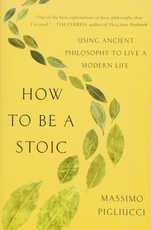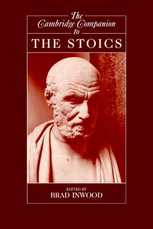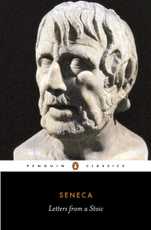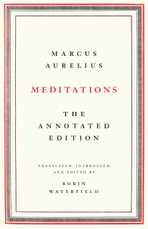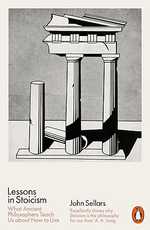

Stoicism The Best 7 Books to Read
For a philosophy founded almost 2,500 years ago by the ancient Greek philosopher Zeno of Citium, Stoicism (a strong philosophical rival to Epicureanism) is seemingly all the rage.
Nuggets of Stoic wisdom dating back to ancient Greco-Roman times — particularly featuring Stoic philosophers Seneca, Epictetus, and Marcus Aurelius — float round the internet and chime with millions across social media. Living up to the four cardinal virtues of Stoicism, and deploying Stoic tools for living in the present, has become fashionable.
This is likely due to how fantastically practical much Stoic wisdom can be. Unlike other philosophy — which, tragically, as a general subject is often perceived to be outdated or pointless (here’s our counter-argument as to why philosophy in today’s world is actually as relevant and important as ever) — Stoicism cuts right to the heart of our day-to-day attitudes and behaviors, and its core principles are distilled in many famous natty aphorisms and quotations.
For example, consider this from Marcus Aurelius (see our pick of Marcus Aurelius’s best books here):
You have power over your mind — not outside events. Realize this, and you will find strength.
Or Epictetus on the dichotomy of control:
If you wish to have peace and contentment, release your attachment to all things outside your control. This is the path of freedom and happiness.
Or Seneca on the shortness of life:
It is not that we have a short time to live, but that we waste a lot of it. Life is long enough, and a sufficiently generous amount has been given to us for the highest achievements if it were all well invested. But when it is wasted in heedless luxury and spent on no good activity, we are forced at last by death's final constraint to realize that it has passed away before we knew it was passing. So it is: we are not given a short life but we make it short, and we are not ill-supplied but wasteful of it… life is long if you know how to use it.
Or, again, Seneca on how to approach strong feelings and emotions:
If you want to determine the nature of anything, entrust it to time: when the sea is stormy, you can see nothing clearly.
Or, again(!), Seneca on how if we want to find peace we must stop chasing unfulfillable desires:
If, no matter how far you travel, there always seems to be some further place you need to reach, that is a sure sign that the desire is contrary to nature…
Very nice quotations — all lifted from the books below. But beyond these practical nuggets of wisdom encouraging us to stay calm and focus on what’s within our own control (and regulate our attitudes to anything outside that control), Stoicism is a fully-fledged, holistic value system that can be adopted as a philosophy for all aspects of life.
In one concise email each Sunday, I break down a famous idea from philosophy. You get the distillation straight to your inbox:
💭 One short philosophical email each Sunday. Unsubscribe any time.
If you’re looking to explore Stoicism further, this reading list contains the best and most accessible introductory books on the subject, as well as the most important primary texts from the great Stoic thinkers themselves. Let’s dive in!
1. Lessons in Stoicism, by John Sellars
If you’re looking for a concise, lucid, no-nonsense primer on the key doctrines of Stoic philosophy, then John Sellars’s Lessons in Stoicism is a brilliant option. Sellars outlines the ancient philosophy in beautiful, crystal-clear prose, and wastes no time in conveying its most important insights and practical remedies.
At under 100 pages, Lessons in Stoicism is a very quick read, but Sellars’s knowledge is deep, and he’s a wonderfully efficient teacher. I highly recommend this book as an introduction to Stoicism.
2. How to Be a Stoic, by Massimo Pigliucci
Massimo Pigliucci’s How to Be a Stoic is also a fantastic place to start for anyone with a budding interest in Stoicism. Pigliucci guides the reader through its core tenets with compelling imaginary conversations with Epictetus, one of the most influential Stoics of all time.
With this accessible format, Pigliucci transposes ancient Stoic wisdom into the 21st century, unlocking practical wisdom for problems we face today, making How to Be a Stoic a very nice entry point to Stoicism.
3. Cambridge Companion to the Stoics, by Brad Inwood
If you’re seeking a more hardcore critical analysis of all things Stoicism, look no further than The Cambridge Companion to the Stoics, published in 1999. This collection of essays from contemporary academics, edited by Brad Inwood, explores the history and influence of Stoicism, and offers a rigorous dissection of its central ideas.
Ideal for those looking to take the next step in their engagement with Stoicism, The Cambridge Companion to the Stoics is a challenging tome of deep value, and belongs on the bookshelf of any aspiring Stoic scholar.
4. How to Live a Good Life (According to 7 of the World’s Wisest Philosophies), by Philosophy Break

How to Live a Good Life (According to 7 of the World’s Wisest Philosophies)
BY PHILOSOPHY BREAK
★★★★★ (100+ reviews)
Get Instant AccessIf you’re interested in learning not just about Stoicism, but comparing its insights to six rival philosophies for life, look no further than the 2026 How to Live a Good Life (According to 7 of the World’s Wisest Philosophies). This concise online guide is instantly accessible from any device and distills the best and most important wisdom from Stoicism, Buddhism, Existentialism, and more.
Of course, we’re a little biased, as we produced this one — but if you’re seeking to understand some of life’s most influential ethical frameworks, examine the pros and cons of each, and discover how they might apply to your own life, then this is the guide for you. How to Live a Good Life (According to 7 of the World’s Wisest Philosophies) gets rave reviews, is better value than buying introductory books for all philosophies covered, and might be just what you’re looking for!
5. Discourses and Selected Writings, by Epictetus
Turning from introductions to primary Stoic texts, where better to start than with the work of the philosopher whose no-nonsense practical wisdom set the foundations for much of the Stoic philosophy that followed?
Former slave turned philosophical teacher, the Greek Stoic Epictetus ran a school in Nicopolis in the early second century AD, the lessons of which were eagerly recorded by Arrian, Epictetus’s most famous pupil.
These recordings have been celebrated throughout the ages as a wonderful guide to the ethics of Stoicism and moral self-improvement, tackling questions on mortality, fear, illness, family, friendship, love, freedom, and how to live a good life.
The potentially life-changing wisdom contained in Epictetus’s Discourses and Selected Writings is as relevant, accessible, and enlightening today as it was 2,000 years ago, making this wonderful book absolutely essential for any student of Stoicism.
6. Letters from a Stoic, by Seneca
While the Roman statesman and dramatist Seneca advocated calmness and moderation through his Stoic philosophy, his life (from 4 BCE to 65 CE) was punctuated by major upheaval.
In 41 CE, following a political dispute, Seneca was exiled to the island of Corsica by the emperor Claudius, but was allowed to return in 49 CE to become a tutor to Nero. When Nero became emperor, Seneca became his advisor. Seneca’s influence over Nero declined with time, and in 65 CE Seneca was forced to take his own life for alleged complicity to assassinate Nero — an accusation of which he was likely to have been innocent.
These events may seem remote from the 21st century, but there is much to learn from the wit, intelligence, and courage with which Seneca faced them.
Supremely accessible, reading Letters from a Stoic — a collection of letters Seneca wrote throughout his lifetime — is like having exclusive access to a deep, beautiful well of profound, practical wisdom addressed directly to you. If you’re interested in Stoicism, your bookshelf will not be complete without Seneca.
7. Meditations, by Marcus Aurelius
The last of the big three Stoic names discussed in this list of the best books on Stoicism, and arguably the most well known, Marcus Aurelius is a titan of the Stoic tradition.
As we outline in our Marcus Aurelius reading list, the Roman emperor reigned from 161 to 180 CE during a time of many significant military conflicts, as well as the Antonine Plague, a pandemic that devastated the population of the Roman Empire, causing the deaths of five million people.
Despite these difficult events — or perhaps because of them — the philosophy Marcus advocated is one of calmness and serenity. His Meditations, a collection of his personal reflections written without any intention of publication, are a significant source of the modern understanding of ancient Stoic philosophy, and have been praised by countless writers, philosophers, monarchs and politicians in the centuries since the great man’s death.
Containing profound lessons on how to deal with hardship and live a good life, Marcus’s Meditations is simply an essential read for anyone interested in Stoicism.
This particular edition is a recent translation by the ancient Greek scholar Robin Waterfield, and with its helpful annotations is recognized as perhaps the best version of Meditations available today.
Further reading
Are there any other books you think should be on this list? Let us know via email or drop us a message on Twitter or Instagram.
In the meantime, why not explore more of our reading lists on the best philosophy books:

View All Reading Lists
Essential Philosophy Books by Subject
About the Author

Get one mind-opening philosophical idea distilled to your inbox every Sunday (free)

From the Buddha to Nietzsche: join 25,000+ subscribers enjoying a nugget of profundity from the great philosophers every Sunday:
★★★★★ (100+ reviews for Philosophy Break). Unsubscribe any time.

Latest Breaks
Each philosophy break takes only a few minutes to read, and is crafted to expand your mind and spark your curiosity.
